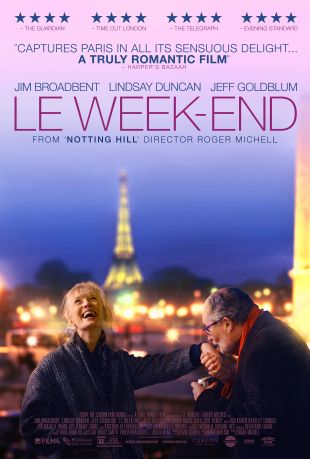
Director Roger Michell scored one of the biggest hits of his career with Venus, which garnered Peter O'Toole an Oscar nomination for his performance as an elderly man who falls in love with a much younger woman. For Le Week-End, Michell evens the age gap by focusing on a 30th anniversary weekend trip for a husband and wife trying to figure out if they still love each other.
Jim Broadbent and Lindsay Duncan play Nick and Meg, a British couple celebrating three decades of marriage with an impromptu weekend getaway to Paris. What should be a happy occasion is marred by their frequent bickering, current financial troubles, and the surprise appearance of a former colleague of Nick's (played by Jeff Goldblum), a fellow professor whose easy charm and loquaciousness is at odds with the couple's natural British reserve. As the two flirt, fight, laugh, and insult one another, both come to a point where they have to face up to their own insecurities and how they have hurt each other.

Like his other films, Michell's tone here is laid-back. His camera is resolutely unobtrusive -- he gives you the feeling that he's observing more than showing -- and the best moments in Le Week-End have a documentary-like air to them, as if he really had captured a longtime couple fighting about sex, money, and infidelity. At its best, the movie feels like a preview of how Richard Linklater, Julie Delpy, and Ethan Hawke might follow up Before Midnight.
Broadbent and Duncan are a perfect match, both for each other and for this material. With his low-key charisma, Broadbent has the advantage of always seeming like a normal human being. The moments here when he tries in vain to make his wife laugh so she'll stop being mad ring as true as the lacerating monologue in the third act in which he lays his self-doubt bare. Duncan's character is more direct and seemingly colder, and while she does nothing to make you think differently about Meg during the film's opening act, there's a slow and subtle reveal of exactly how and why this woman has constructed her own defense mechanisms to deal with her disappointments in her husband and herself.

The performances are wonderful: The leads and Goldblum are a pleasure to watch. However, the picture has almost no dramatic tension because the scenes in which the couple fight are so casual and believable that we're not necessarily invested in seeing them work it out -- they might be better off away from each other. The film is so charmingly slight that its weightlessness makes it seem inconsequential. It's a movie where you don't necessarily care what happens next, but you don't mind hanging out with the characters for a little while longer.
